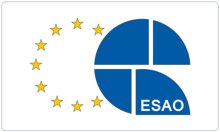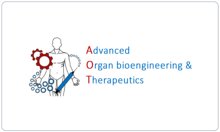Welcome to ESAO 2025, an event dedicated to advancing the field of organ bioengineering, artificial organs, and regenerative medicine. This year, we proudly host the ESAO Annual Congress at the University of Twente’s TechMed Centre, under the theme Innovations in (Bio)Artificial Organs and Organ Models'.
Organ failure continues to be one of the most significant challenges in modern medicine, with millions of lives affected globally. The European Society for Artificial Organs (ESAO) was established to tackle this challenge by fostering innovation, collaboration, and the exchange of ideas in the field of artificial organ technology, organ bioengineering, and related therapies. ESAO 2025 offers a platform to bring together experts from diverse disciplines to share groundbreaking research, explore novel therapeutic approaches, and inspire the next generation of scientists and clinicians. Our mission is to connect the global community of scientists, clinicians, engineers, and industry leaders who are committed to improving patient care and outcomes through innovation in organ support systems, tissue engineering, and beyond.
ESAO
The European Society for Artificial Organs (ESAO) is an interdisciplinary scientific society established in 1974. Its mission is to advance the science, development, and application of artificial organs and organ support systems to address critical medical needs. By promoting collaboration and fostering knowledge exchange, ESAO drives innovation to save lives and improve the quality of life for patients worldwide.
ESAO working groups
Apheresis and Adsorption
Chair: Dr. Volker Witt
Mission Statement:
The working group is part of the World Apheresis Association (WAA) apheresis registry activity.
Participating members/centres that register data to the WAA registry (www.waa-registry.org) are adopted into the analyses of data and manuscript publications based on data recovered from the registry. Results are presented at the ESAO congresses during apheresis sessions. Participating members of the group are invited to make/and perform/ data analysis, publications and presentations. They are invited to become members of the ESAO as well as other mother societies of the WAA such as the ESFH (European Society For Haemapheresis) and ISFA (International Society For Apheresis).
The activity is at no cost for participating centres. Until now data of more than 70.000 apheresis procedures have been entered into the registry.
Invitation to join the working Group:
We invite all centres that perform therapeutic apheresis (including allogenic and autologous stem cell collection) in a global perspective to participate in the activities by applying for access through the home page:
Web address: www.waa-registry.org
Bioartificial Organs
Chair: Dimitrios Stamatialis
Mission Statement:
The working group will integrate and coordinate research, education and innovation activities in the field of bioartificial organs, which combine biomaterials with cells for developing organs to assist or replace failing patient organs.
The field of bioartificial organs requires close interaction of a broad range of disciplines spanning from biomaterials science and engineering to biology and medicine. The working group will include experts from all these disciplines and will organise regularly:
- Symposia / sessions in various international conferences, including ESAO, ASAIO, Euromembrane, ESB and others, to promote the research activities in the field.
- Training events for young researchers entering the field.
- Outreach activities to promote the activities of the group to a broader audience.
The experts will be invited to join the working group.
Contact email and phone: d.stamatialis@utwente.nl
Heart Support
Chair: Marcus Granegger
Co-Chair: Kathrin Fraser
Mission statement:
The ESAO Working Group HEART SUPPORT within the ESAO Topical Forum is devoted to connect efficiently researchers working on the specific topic “Heart Support” and to make their research more effective. Participating in scientific activities of the society including participation in the scientific program of annual ESAO congress, organization of own meetings and special sessions are major activities of WG HEART SUPPORT.
The ESAO Working Groups are designed to work without funding, however, if a source to obtain funds for meetings or other needs can be found, it should be tapped.
Contact email: marcus.granegger@meduniwien.ac.at
Tissue Engineering
Chair: Prof. Dr. Nuno Neves
Mission statement:
The working group will integrate and coordinate research, education and innovation activities in the field of tissue engineering, which combine biomaterials with cells for developing tissues and organs to regenerate tissues and organs undergoing failure caused by disease or by trauma.
The field of tissue engineering requires close interaction of a broad range of disciplines spanning for biomaterials science and engineering to biology and medicine. The working group will include experts from all these disciplines and will organize regularly:
- Symposia / sessions in various international conferences, including ESAO, TERMIS, Society for Biomaterials (USA) and others, to promote the research activities in the field.
- Training events for young researchers entering the field.
- Outreach activities to promote the activities of the group to a broader audience.
Contact email and phone: nuno@dep.uminho.pt
Uremic Toxins
Chair: Prof. Joachim Jankowski
Co-Chair: Griet Glorieux
Mission Statement:
Currently, the costs of these diseases are in the range of 500 billion Euros per year, increasing at a rate of ca. 10 % per year.
Recent reports including our own data clearly indicate that a large proportion of renal, cardiovascular and/or cerebrovascular diseases are based on a common background, namely vascular lesions including endothelial cell damage. In fact, this may be detectable in the kidney initially since the kidney has the highest proportion of microvasculature. In later stages of the disease, damage to larger vessels and organs will become evident. Disease progression is enhanced by age, since lesions accumulate during life time and a reduced ability of repair. It is also enhanced by conditions like diabetes mellitus and the metabolic syndrome. As a consequence many renal, cardiovascular, and cerebrovascular diseases can be considered as systemic disorders affecting the (micro)vasculature.
It is currently impossible to cure these diseases at advanced stages. However, treatment can reduce or even stop disease progression. Unfortunately, as mentioned above, a state-of-the-art treatment with the aim to slow disease progression will not be available for all affected patients of the European population without a financial collapse of the public health system. The later treatments begin, the higher will be the resulting costs. In addition, quality of life is gradually reduced in advanced stages of disease. As a consequence, it is imperative to find ways to detect and treat this disease complex in early stages to ensure a higher quality of life for elderly Europeans and to save costs (e.g. anti-inflammatory or anti-hypertensive drugs are much cheaper than dialysis or intensive care after a heart attack or a stroke).
The mission of EUTox is based on these assumptions. Our aim is to prevent renal and vascular disease by
- defining biomarkers that would allow early diagnosis of disease onset,
- identifying compounds that delay or halt disease progression,
- improving therapeutic strategies aimed at prevention of disease and disease progression.
EUTox will develop potential strategies to cope with these challenges and apply these almost immediately in the clinical setting.
One of the most advanced stages of the disease is chronic kidney disease resulting in renal replacement therapy including hemodialysis. As a first step, biomolecules (biomarkers and potential therapeutic targets) will be identified, which appear to be related to renal and vascular disease. Many of these biomarkers represent so-callled uraemic toxins – compounds that are cleared by the healthy kidneys under normal conditions – are retained in kidney disease, and affect biochemical and biological functions inducing complications and decreasing the life span of affected subjects.
The EUTox Consortium aims to accomplish these goals by using a panel of state-of-the-art technologies for analysis of body fluids (blood, dialysis fluid, urine) and tissue (blood vessels….), with emphasis on multi-parametric analyses and proteomics.
Similar experiments are performed using body fluids from patients with less advanced disease stages, and also of unaffected healthy volunteers.
These efforts allow us to define biomarkers for different stages of renal and vascular disease, for disease progression and for the evaluation of therapeutic achievements. In addition, we are identifying compounds contained in the blood, which are consequently in direct contact with the vascular system and may influence disease progression. The identified compounds will be tested in vitro subsequently.
EUTox is composed of renowned clinicians from large clinical centres, leading clinical and basic scientists, highly innovative biotech companies and major medical and pharmaceutical companies. This unique and powerful team puts EUTox in an unsurpassed position to relay results from research to clinical use within very short time frames.
Web address: http://www.uremic-toxins.org/index.html
Education
Chairman: Marc Müller
Mission statement:
The Working Group Education aims to offer training for young scientists as well as for researchers in interdisciplinary field of Artificial Organs. This includes, but is not limited to, the organization of meetings in formats ensuring a high extent of interaction between the participants, and measures to support the exchange of students as well as the encounter of students with experienced researchers from different disciplines.
We will achieve these aims by:
- Organisation of Summer Schools and Winter Schools dedicated to topics in the field of Artificial Organs to support the exchange of knowledge and to promote collaboration in the highly interdisciplinary field of Artificial Organs.
- Initiation of joint applications at European level, such as initial training networks (ITN) for PhD students in the field of organ support, extracorporeal therapies, biomaterials, and regeneration.
- Joint publications, book chapters, or handbooks in the field of artificial organs.
Contact email and phone: mueller@imp.uni-hannover.de
Albunet
Chair: Dr. Gerd Klinkmann
ALBUNET has been established to investigate modifications of the albumin molecule and it´s in vitro and in vivo clinical consequences.
Mission Statement:
ALBUNET is a group of experts from basic research and applied medical science, both from academia and industry, working together with the focus on the functionality of the albumin molecule in various diseases and related in vitro and clinical therapies, such as hemodialysis, albumin-dialysis in liver therapies and the use of this protein in apheresis-treatments.
Vision:
The goal of ALBUNET is to establish a cooperative research platform in order to deepen and spread the knowledge about albumin in basic and clinical science communities. The first public appearance of ALBUNET was at the Annual Congress of the European Society of Artificial Organs in Warsaw in 2016.
ALBUNET is seeking collaboration of other European medical networks, such as eutox.org and sepnet.de, as well as all scientists from the European Society for Artificial Organs.
Contact: gerd.klinkmann@uni-rostock.de
University of Twente - Advanced Organ Bioengineering and Therapeutics
This year’s congress is hosted by Advanced Organ Bioengineering and Therapeutics (AOT), a leading research group at the University of Twente, in collaboration with the university’s TechMed Centre. AOT focuses on cutting-edge organ bioengineering research, including advanced organ-on-chip systems, biomaterials, and regenerative therapies. Located at the heart of the Netherlands’ innovation ecosystem, the TechMed Centre is a global hub for medical technology, known for its state-of-the-art facilities and interdisciplinary research approach.
Together, ESAO, AOT, and the University of Twente - TechMed Centre aim to drive the future of artificial organ technology by fostering a collaborative and inspiring environment for researchers, clinicians, and industry leaders.
Join us at ESAO 2025 as we shape the future of organ bioengineering and artificial organ solutions to address today’s medical challenges and transform healthcare for generations to come.





